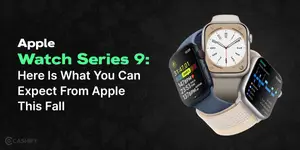Apple Vision Pro and Meta Quest 3 wear two crowns in the ever-changing landscape of Virtual Reality (VR) and Mixed Reality (MR) as these two have become favourites among technology enthusiasts and professionals. These are the leading headsets on the market today which give you a near-real feel by merging digital and physical environments. However, there are different strengths, weaknesses, and use cases for each of them and hence this is not an easy decision to make.
Also read: Everything You Need To Know About Roblox Metaverse
Apple Vision Pro vs Meta Quest 3: Pricing
On its own, Apple Vision Pro starts from $ 3500 (approximately ₹3,00,000 before tax) for a 256GB model—it boasts of seamless integration with other Apple devices. It is a standalone computer as well as a virtual 4K monitor for Macs. Apple claims that it can be operated through eyesight, hands or voice which indicates that it has a highly intuitive user interface but some limitations associated with wearing gloves under bright light when using it should also be mentioned.
On the other hand, Meta Quest 3 is much cheaper with starting models at $499 (about 41,000 Rupees) and has been praised for its stand-alone nature, comfort and a wide range of games and apps. It however features intuitive Touch controllers which are thinner by 40% compared to previous versions and the latest Snapdragon chipset for improved graphics and gameplay experience. Nevertheless, its desire to satisfy diverse users from those interested in gaming or business has made people question if it suffers from an identity crisis although it has advanced in technology as well as being user-friendly.
Also Read: Apple Vision Pro Reaction: Netizens Responds In A Hilarious Manner
Apple Vision Pro vs Meta Quest 3: Specifications
| Features | Apple Vision Pro | Meta Quest 3 |
| Resolution | 3660×3142 pixels per eye, near 4K quality | 2,064 x 2,208 pixels per eye |
| Refresh Rate | Variable (90Hz, 96Hz, 100Hz) | Variable (72Hz, 80Hz, 90Hz, 120Hz) |
| Storage | 256 GB, 512 GB, 1TB | 128GB, 512GB |
| Features | Ambient Spatial Audio, EyeSight, Mixed reality, Hand tracking and Gesture control | Hand tracking, PC compatibility, Voice commands, Mixed Reality |
| RAM | 16GB | 8GB |
| Tracking | LEDs and infrared cameras | N/A |
| Audio | Spatial audio with two speakers | Enhanced near-field speakers |
| Display Type | Micro-OLED | Dual LCD with Pancake lenses |
| Refresh Rate | 90 Hz | 120 Hz |
| Processor | Apple M2 + Apple R1 | Qualcomm Snapdragon XR2 Gen 2 |
| Weight | 600 grams | 515 grams |
| Battery Life | Around 2 hours | Up to 2.5 hours |
| Field of View | About 100 degrees (horizontal) | 110 degrees (horizontal) |
However, while comparing Apple Vision Pro with Meta Quest 3 there is a need to consider beyond just the cost and specifications but also think about the ecosystems, and experiences that one wants to have as well as how these devices fit into their personal life or profession.
Also Read: Top 5 Augmented Reality Apps For Android And iOS!
Apple Vision Pro vs Meta Quest 3: Design and Ease of Use
In the world of virtual reality, each Apple Vision Pro and Meta Quest 3 carries its unique style reflecting their disparate design philosophies and commitment to user comfort.
The Vision Pro has an enclosure that is covered with a sleek, black glass-like finish with a lot of sensors housed in it, making look more modern. It is also designed with a single strap that fits around the user’s head and two speakers are integrated into it to give an immersive audio experience. The designers at Apple have created something truly unique by incorporating controls into this strap thus ensuring that it remains stylish yet functional.
Additionally, there is the Fit Dial for users who may want to have a snug and secure fit while there is an extra top strap for those who require extra stability. Unlike its rival which has its battery located within the headset itself, Vision Pro’s battery connects through its strap representing an unusual power management approach that emphasizes convenience and continuous usage despite having only a short battery life.
However, Meta Quest 3 goes for a more utilitarian design. This includes three pill-shaped modules on each side of the front which serve as camera and sensor locations supported by a Y-shaped patterned headband which provides stability and comfortability. Meta is also improving on ensuring balance and fit of their headset which now comes with an IPD adjustment feature to fine-tune lens distance for best eye comfort.
Moreover, they make controllers for easy use, characterized by their simple layout that becomes second nature after practising with them over time. The Meta Quest 3 is tailored for practicality, offering a lightweight solution with customizable options to enhance user comfort and engagement.
Also Read: Exynos 2400 vs Apple A16 Bionic
Apple Vision Pro vs Meta Quest 3: Display Tech
The comparison between Apple Vision Pro and Meta Quest 3 regarding display technology and audio capabilities accentuates the positive aspects and advancements of each device towards virtual reality experiences.
The new Meta Quest 3 device employs advanced dual LCD screens having mini-LED pancake lenses that yield a resolution of 2,064 x 2,208 pixels per eye as compared to its predecessor. The improvement in this aspect is extremely noticeable since it enhances the clarity of images while expanding the field of view to as much as 110 degrees horizontally and 96 degrees vertically. The audio system which is formulated inside the headband provides a loud three-dimensional sound that can be utilized by using external headphones connected via a 3.5mm jack for better sound quality.
However, Apple Vision Pro ups its game through micro-OLED displays whose resolution is an astonishing 24MP—a figure roughly equivalent to that of a full HD image or even more than what any other VR system offers. This advancement leads to significant improvement in visual quality, although it narrows down pictures’ perspective just slightly, i.e., approximately at about one hundred degrees horizontally.
In addition, Apple improves sound fidelity by including speakers on the headband along with support for personalized spatial audio; however, it still requires USB-C instead of a traditional headphone jack with a 3.5mm plug-in.
Each device caters to specific preferences in visual and auditory VR experiences. The Meta Quest 3 offers a wider field of view and versatile audio connectivity, appealing to users who prioritise immersion and flexibility. On the other hand, the Apple Vision Pro, with its superior resolution and innovative audio features, targets those who value high fidelity and integrated ecosystem experiences.
Also Read: Samsung Galaxy S24 vs iPhone 15 Pro Max
Apple Vision Pro vs Meta Quest 3: Performance
Meta Quest 3 has Qualcomm Snapdragon XR2 Gen 2 as its chipset, which is a major jump in VR technology. This particular processor increases not only load times but also the gaming experience through smooth high-resolution visuals and smooth support for demanding VR applications.
Going against the grain, Apple Vision Pro demonstrates Apple’s strength in chipset design through a dual-chip setup. The M2 chip, with an 8-core CPU, and a 10-core GPU among other specifications operates alongside the R1 chip for quick data processing and low-latency communication. Along with handling complex VR environments superbly, this combination fits into the Apple ecosystem seamlessly, optimizing software performance and ensuring compatibility.
Meta Quest 3, on the one hand, has impressive battery life which is perfect for short sessions while Vision Pro on the other hand has relatively limited battery life advising either stationary use or depending on an external power bank to lengthen its mobility. Power users are targeted by Vision Pro as it indicates Apple’s dominance of the high-end VR market. The broader field of view and portability make Quest 3 an excellent entry point for those new to VR since it balances performance with accessibility.”
The Vision Pro’s powerful M2 and R1 chips cater to those seeking the utmost in VR performance and ecosystem integration, while the Quest 3’s Snapdragon XR2 Gen 2 chip offers a versatile and efficient solution for immersive VR experiences.
Also Read: 5 Best Oculus Quest 2 Games To Experience New Worlds!
Apple Vision Pro vs Meta Quest 3: Software
There is a great contrast between Meta Quest 3 and Apple Vision Pro 3 in terms of virtual reality systems. When booting it up, the Quest 3 has several pre-installed games and applications because it runs on the Android version. It’s part of a series that has been around for a while, so there is a wide range of VR games to choose from.
Unlike this one, Apple Vision Pro relies on visionOS which may resemble the operating system found on iPhones as well as iPads. That implies that many apps will be available and quite several companies are expected to make their apps work with it. Despite having witnessed but few games for it, however, its controls and video look good due to Apple’s robust software and powerful chips.
The Vision Pro even allows you to play approximately two hundred fifty different titles from Apple Arcade but these games might feel more like playing them on a cinema screen than surrounding you with VR. On the other hand, besides gaming purposes, Apple is marketing the Vision Pro as a business tool, for daily activities and watching videos thereby bringing their iDevice experience into the virtual reality world.
So, if you’re looking for a lot of different games, the Quest 3 is a great choice because it lets you play games from its store and even from Steam with the right setup. But if you’re more into Apple products and want a device that blends work and play, the Vision Pro could be exciting, especially with its advanced chips and software.
Also Read: Apple Vision Pro Features
Apple Vision Pro vs Meta Quest 3: Passthrough and AR/VR
To stand out, the Apple Vision Pro has a wide range of cameras and sensors that are meant to offer an unmatched AR/VR experience. This includes a main stereoscopic 3D camera system having an 18mm lens which can take photographs with a resolution of 6.5 stereo megapixels for high-quality pictures and videos in a three-dimensional format.
Apart from two primary high-resolution cameras, the device also incorporates six world-facing tracking cameras, four eye-tracking ones, a TrueDepth camera for face recognition, a LiDAR Scanner for depth sensing, four inertial measurement units (IMUs) for motion tracking as well as flicker sensor and ambient light sensor.
Conversely, the Meta Quest 3 emphasizes its MR capabilities through a six-camera setup, primarily focused on spatial tracking and mixed-reality viewing. Its innovative design includes a front-facing four-camera array, arranged in vertical stacks, dedicated to capturing the environment and enabling full-color MR experiences. Additionally, it features two bottom-edge spatial cameras, laying the groundwork for future enhancements like full-body tracking.
Also read: Best VR Headsets To Buy In India
Apple Vision Pro vs Meta Quest 3: What to Buy
Choosing between the Apple Vision Pro and Meta Quest 3 depends on your priorities and budget. If you’re looking for a premium experience and are willing to invest in the higher cost, you should get the Apple Vision Pro. However, for those seeking a cost-effective entry into VR with a broad range of applications, the Quest 3 is an excellent choice; in our opinion for 95% of the users, Quest 3 is a no-brainer purchase.
Also Read: Virtual Reality Evolution: From Gaming To Real-World Application
Turn your dream of buying an iPhone into a reality. Buy Refurbished Apple iPhone from Cashify at almost half price. It is like-new, can be bought on no-cost EMI and comes with 6 months of warranty, which can be availed at any of Cashify 200+ stores.
















